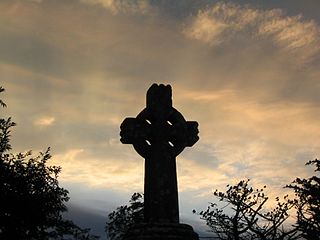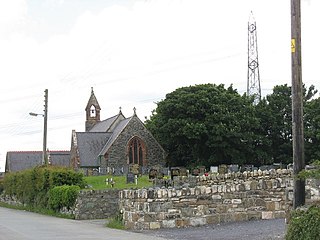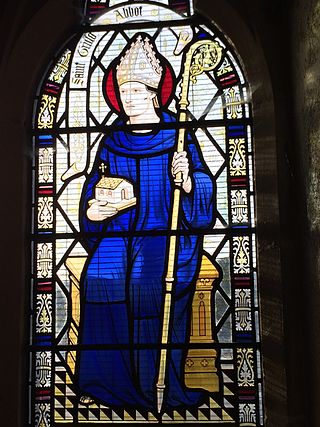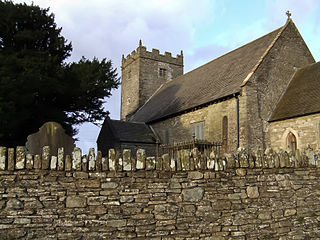Related Research Articles

Saint David was a Welsh bishop of Mynyw during the 6th century. He is the patron saint of Wales. David was a native of Wales, and tradition has preserved a relatively large amount of detail about his life. His birth date, however, is uncertain: suggestions range from 462 to 512. He is traditionally believed to be the son of Saint Non and the grandson of Ceredig ap Cunedda, king of Ceredigion. The Welsh annals placed his death 569 years after the birth of Christ, but Phillimore's dating revised this to 601.

Celtic Christianity is a form of Christianity that was common, or held to be common, across the Celtic-speaking world during the Early Middle Ages. Some writers have described a distinct Celtic Church uniting the Celtic peoples and distinguishing them from adherents of the Roman Church, while others classify Celtic Christianity as a set of distinctive practices occurring in those areas. Varying scholars reject the former notion, but note that there were certain traditions and practices present in both the Irish and British churches that were not seen in the wider Christian world.

Saint Elen, often anglicized as Helen, was a late 4th-century founder of churches in Wales. Traditionally, she is said to have been a daughter of the Romano-British ruler Octavius / Eudaf Hen and the wife of Magnus Maximus / Macsen Wledig, the 4th-century emperor in Britain, Gaul, and Spain who was killed in battle in 388. Although never formally canonized by Rome, Elen is traditionally considered a saint in the Welsh Church; in English she is sometimes known as Saint Helen of Caernarfon to distinguish her from Saint Helena.

Samson of Dol was a Cornish saint, who is also counted among the seven founder saints of Brittany with Pol Aurelian, Tugdual or Tudwal, Brieuc, Malo, Patern (Paternus) and Corentin. Born in southern Wales, he died in Dol-de-Bretagne, a small town in north Brittany.

Llandudno is a seaside resort, town and community in Conwy County Borough, Wales, located on the Creuddyn peninsula, which protrudes into the Irish Sea. In the 2011 UK census, the community – which includes Gogarth, Penrhyn Bay, Craigside, Glanwydden, Penrhynside, and Bryn Pydew – had a population of 20,701. The town's name means "Church of Saint Tudno".

Paul Aurelian was a 6th-century Welshman who became first bishop of the See of Léon and one of the seven founder saints of Brittany. He allegedly died in 575, rumoured to have lived to the age of 140, after having been assisted in his labors by three successive coadjutors. This suggests that several Pauls have been conflated. Gilbert Hunter Doble thought that he might have been Saint Paulinus of Wales.

Saint Illtud, also known as Illtud Farchog or Illtud the Knight, is venerated as the abbot teacher of the divinity school, Bangor Illtyd, located in Llanilltud Fawr in Glamorgan, Wales. He founded the monastery and college in the 6th century, and the school is believed to be Britain's earliest centre of learning. At its height, it had over a thousand pupils and schooled many of the great saints of the age, such as Saint David, Samson of Dol, and the historian Gildas.

Saint Cadoc or Cadog was a 5th–6th-century Abbot of Llancarfan, near Cowbridge in Glamorgan, Wales, a monastery famous from the era of the British church as a centre of learning, where Illtud spent the first period of his religious life under Cadoc's tutelage. Cadoc is credited with the establishment of many churches in Cornwall, Brittany, Dyfed and Scotland. He is known as Cattwg Ddoeth, "the Wise", and a large collection of his maxims and moral sayings were included in Volume III of the Myvyrian Archaiology. He is listed in the 2004 edition of the Roman Martyrology under 21 September. His Norman-era "Life" is a hagiography of importance to the case for the historicity of Arthur as one of seven saints' lives that mention Arthur independently of Geoffrey of Monmouth's Historia Regum Britanniae.

Saint Asaph was, in the second half of the 6th century, the first Bishop of St Asaph, i.e. bishop of the diocese of Saint Asaph.

Maentwrog is a village and community in the Welsh county of Merionethshire, lying in the Vale of Ffestiniog just below Blaenau Ffestiniog, within the Snowdonia National Park. The River Dwyryd runs alongside the village. Its population of 585 in 2001 increased to 631 at the 2011 Census. The Community of Maentwrog includes the village of Gellilydan.
Erbin of Dumnonia was a 5th-century King of Dumnonia and saint of Wales.

Saint Afan of Builth was an early 6th-century Welsh bishop, martyr, and saint. His feast day is generally placed on 17 November, although the Demetian Calendar formerly used in southern Wales placed it on the 16th; it is no longer observed by either the Anglican or Catholic church in Wales.

Saint Teilo, also known by his Cornish name Eliud, was a British Christian monk, bishop, and founder of monasteries and churches. He was from Penalun (Penally) near Tenby in Pembrokeshire, south Wales.

Saint Trillo is the patron saint and founder of the churches at Llandrillo, Denbighshire and Llandrillo yn Rhos, Rhos-on-Sea in Conwy County Borough, Wales.

Eglwysilan is an ecclesiastical parish and hamlet in Wales, within the community of Aber Valley in the unitary authority of Caerphilly County Borough.
Cyllin was a legendary, and possibly historical British king of the 1st century AD, early Christian saint and the last pendragon of Great Britain. His existence is based on very limited evidence. Richard Williams Morgan claimed that a reference to him as a son of Caratacus was found in the family records of Iestyn ab Gwrgant and used this as evidence of early entry of Christianity to Britain;
Cyllin ab Caradog, a wise and just king. In his days many of the Cymry embraced the faith in Christ through the teaching of the saints of Cor-Eurgain, and many godly men from the countries of Greece and Rome were in Cambria. He first of the Cymry gave infants names; for before, names were not given except to adults, and then from something characteristic in their bodies, minds, or manners.

Saint Gwenafwy (Wenappa) was a pre-congregational saint of medieval South Wales. She was a daughter of Caw of Strathclyde, and sister of Peillan, Eigron and Peithein among others. She went to Cornwall with her brother Eigron where she is the patroness of Gwennap.
Saint Eigron was a pre-congregational saint of medieval South Wales.
Saint Gwrhai was a 5th-century saint of Wales.

Saint Eigrad or Eugrad was a sixth-century Welsh saint and the founder of St Eugrad's Church in Llaneugrad, Anglesey.